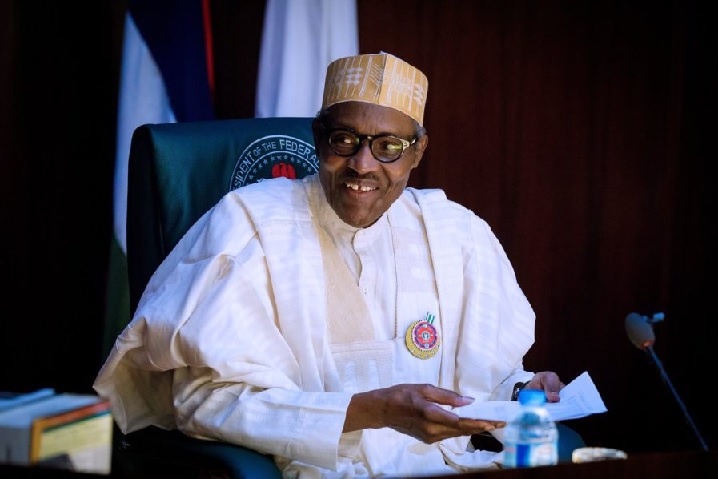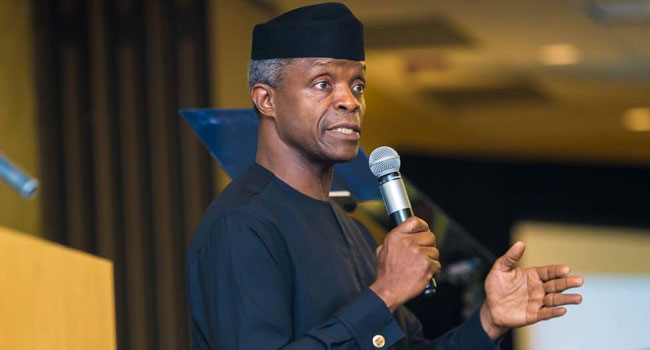NEWS
Organised Private Sector Lauds Buhari Over AfCFTA Signing

The Organised Private Sector (OPS) has lauded President Muhammadu Buhari for including Nigeria in the African Continental Free Trade Agreement (AfCFTA) at the just concluded Africa Union Summit on Sunday in Niamey.
The sector’s chieftains told the News Agency of Nigeria (NAN) on Monday in Lagos that Nigeria has more to gain because it would have access to the larger market of the member countries.
Director-General, Lagos Chamber of Commerce and Industry (LCCI), Mr Muda Yusuf, commended Buhari for following the recommendations of the Presidential Committee on the Assessment of AfCFTA.
According to Yusuf, Nigeria’s access to African countries, whose population is estimated at 1.
2 billion and a two trillion dollars economy, offers tremendous opportunities for our firms.“Not signing before now gave us the opportunity to put our views on the table to shape the structure of the agreement.
“We, therefore, welcome the decision of the Federal Government to the agreement,” he said.
The director-general, however, said though this would improve trade among African countries, appropriate safeguard measures should be put in place to protect vulnerable sectors of the economy.
He urged relevant agencies to effectively enforce the rules of origin of the agreement so as to build a competitive economy rather than having a disproportionate approach to the country’s industrialisation.
Also, Mr Mansur Ahmed, the President, Manufacturers Association of Nigeria (MAN) said MAN was happy that the agreement had been signed after exhaustive consultations and analysis of the advantages and disadvantages of the agreement.
“Initially, we (manufacturers) were not fully prepared, but right now, we are more than ready to benefit and exploit the framework of the agreement,” he said.
Commenting, the Director-General, Nigerian Association of Chambers of Commerce, Industry, Mines and Agriculture (NACCIMA), Mr Ayoola Olukanni, said signing of AfCFTA was a good development.
Olukanni said that it was a reflection of Buhari’s fulfillment of carrying all along before signing the agreement.
Olukanni said the AfCFTA framework required that operational modalities of the Rules of Origin, Tariff Schedules, Tariff Concessions, Services, and Investment Rules, among others were strictly followed by the relevant agencies.
“As Africa gears up for the implementation of this landmark agreement, a few issues deserve our attention.
“The AfCFTA is designed for the economic integration of Africa along the lines of what is evident within the European Union (EU), the North American Free Trade Agreement (NAFTA), and the Association of Southeast Asian Nations (ASEAN).
“The reality is that AfCFTA is finally here, and the recent stakeholders’ meeting organized by the Coalition for Dialogue on Africa (CoDA) in Addis-Ababa is a clear indication that we are on the margins of history on the emergence of Africa as a single and unified market.
“However, only those who prepare for it will harness the full potentials,” he said.
Olukanni added that before the agreement, most Nigeria’s companies, including banks, operated in 18 African countries, while Nigeria practically dominated the entertainment and creative sector of the continent.
“Nigeria airline operators, in spite of the the tough terrain of the domestic Aviation sector, provide services across the west and other parts of Africa.
“Now is the time for other sectors to harness the potential of the agreement,” he said.
In his remarks, Prof. Olukunle Iyanda, President, Nigerian Institute of Management (NIM), expressed worried that the agreement would not be beneficial to the nation due to the attendant infrastructure deficit of the country.
“The agreement will not be too beneficial since the parameters to produce enough are not in place.
“My advice is that we specialise in the production of higher value export like cars, equipment and machineries rather than exchanging small value goods among member nations,” he said.
NAN reports that AfCFTA is to bring together all 55 member states of the African Union covering a market of more than 1.2 billion people, including a growing middle class, and a combined gross domestic product (GDP) of more than 3.4 trillion U.S dollars.
NEWS
Tinubu Approves Management Unit for Health Sector Renewal Investment Initiative
President Bola Tinubu has approved the establishment of the Sector-wide Coordinating Office-Programme Management Unit (SCO-PMU) domiciled in the Office of the Coordinating Minister of Health and Social Welfare.A statement on Friday by his spokesman, Chief Ajuri Ngelale, said the unit would ensure efficient, transparent and accountable management of external grants mobilised towards the implementation of the Nigeria Health Sector Renewal Investment Initiative (NHSRII).
Ngelale said SCO-PMU would report to a Steering Committee/Ministerial Oversight Committee chaired by the Minister, including the Minister of State, Permanent Secretary; Ministry of Finance, Ministry of Budget and Economic Planning and relevant development partners. “The SCO-PMU will serve as the secretariat and delivery unit for the NHSRII and is to be headed by a national coordinator (NC).“The functions of the SCO-PMU include programme management, monitoring and evaluation, engagement and supervision of Independent Verification Agents (IVAs) for NHSRII programmes and fiduciary management, among others.“Consequently, the President has approved the appointment of Dr. Muntaqa Umar Sadiq as the National Coordinator of SCO-PMU,” he said.Report says that Sadiq has over 17 years of experience in public health, impact investing, investment banking, energy, and climate financing across the health, finance, climate and energy sectors.He had served as Head of the Performance Management and Delivery Unit at the Federal Ministry of Health and Social Welfare and Chief Executive Officer of the Private Sector Health Alliance of Nigeria.He also served as Head of the Nigeria Energy Transition Office and Private Sector Engagement Adviser at the World Bank. (NAN)
Education
FG Denies Slash in Students’ Allowances

The Federal Government says it has no plan to slash scholarship students’ allowances as recently projected in the media.The Minister of Education, Prof. Tahir Mamman, stated this during a meeting with the leadership of the National Association of Nigerian Students (NANS) in Abuja on Friday.
Report says that there was a report that the ministry, through the Federal Scholarship Board, announced a slash in allowances of foreign scholars stranded in Russia, Morocco, and Algeria among others.
The slash in scholars’ allowances under the federal government’s Bilateral Educational Agreement Scholarship (BEA) was attributed to the economic crises.Mamman said that there was no slash in scholars` allowances but rather an adjustment due to Foreign Exchange fluctuations (FOREX).“We want to clarify what has been in the media on allowances paid to scholars under the Bilateral Scholarship Agreement.“We want to place it on record that the ministry and the Federal Government for that matter have not slashed the allowances due to students.“What happened is some adjustments in the amount due to them because of FOREX fluctuations, and as soon as we get the balance we have applied for, we will pay them.“But for now, what is in the budget is what we can pay. So, there is no slash, we will even be happy to increase, so this is what has led to the adjustments,” he said.(NAN)NEWS
Planned Protests: CAN calls for calm and patience

By Laide Akinboade, Abuja
The Christian Association of Nigeria, CAN, on Friday, has urged Nigerians to calm and patient with Federal Government and should give the the government more time to address these pressing concerns.In a statement issued by CAN and signed by Archbishop Daniel Okoh ,President, CAN and made available to journalists in Abuja.
CAN also urged all Nigerians to consider alternative means of expressing their grievances. He however said CAN stands in solidarity with the citizens of nation during these challenging times of economic hardship and pervasive hunger. The statement reads in part, “As we navigate this period of crisis, it is imperative to uphold the constitutional rights of every Nigerian to peacefully protest and express their grievances. The right to assemble and voice discontent is a cornerstone of our democracy and must be protected and respected by all. Peaceful protests are a powerful tool for civic engagement, allowing the populace to communicate their concerns and hold leaders accountable. However, the anxiety related to the impending protests is heightening, especially given the volatile experiences in countries like Kenya and Pakistan.”We must also draw from our recent history. The #ENDSARS and #RevolutionNow protests, though rooted in genuine grievances, were marred by tragic incidents where miscreants hijacked the process. This led to widespread looting, destruction of properties, and unfortunate loss of lives. These experiences have shown us that mass demonstrations can quickly degenerate into chaos if not properly managed and coordinated.” In light of the planned protests scheduled to commence on 1st of August, CAN urges all Nigerians to consider alternative means of expressing their grievances. We recommend giving the government more time to address these pressing concerns. This period should be used to explore other legal avenues that will not easily give hoodlums the opportunity to hijack the exercise to destroy our national assets or endanger lives and properties. Dialogue, petitions, and town hall meetings are viable options that can yield positive results without the risk of disorder.”We call on the government to cut the cost of governance and expedite its efforts to alleviate the hardships in the land. The opulent lifestyle of political office holders must be addressed to demonstrate the sincerity of those in government to improve the living conditions of the people. Likewise, it is imperative that the government implements the newly approved national minimum wage to provide immediate relief to struggling families.”Furthermore, specific measures must be taken to put an end to kidnappings, banditry, and mass killings that have plagued various parts of our country. The security and well-being of every Nigerian should be paramount, and urgent action is required to restore peace and order.”We also call on the government to expedite its efforts to alleviate the hardships in the land. There is an urgent need for more refined and effective policies that address the root causes of the economic challenges we face. The government must deepen its consultations with stakeholders, including religious leaders, to create a more inclusive and comprehensive approach to problem-solving. By working together, we can devise sustainable solutions that reflect the needs and aspirations of the people.”In these trying times, let us all remember the words of our Lord Jesus Christ: “Blessed are the peacemakers, for they shall be called the children of God” (Matthew 5:9). As we seek to bring about positive change, let us do so with a spirit of peace, love, and unity. Our strength lies in our ability to come together, support one another, and work collectively toward a better Nigeria.”We pray for wisdom and discernment for our leaders, resilience and hope for our citizens, and divine intervention to guide us through these difficult times”.




















